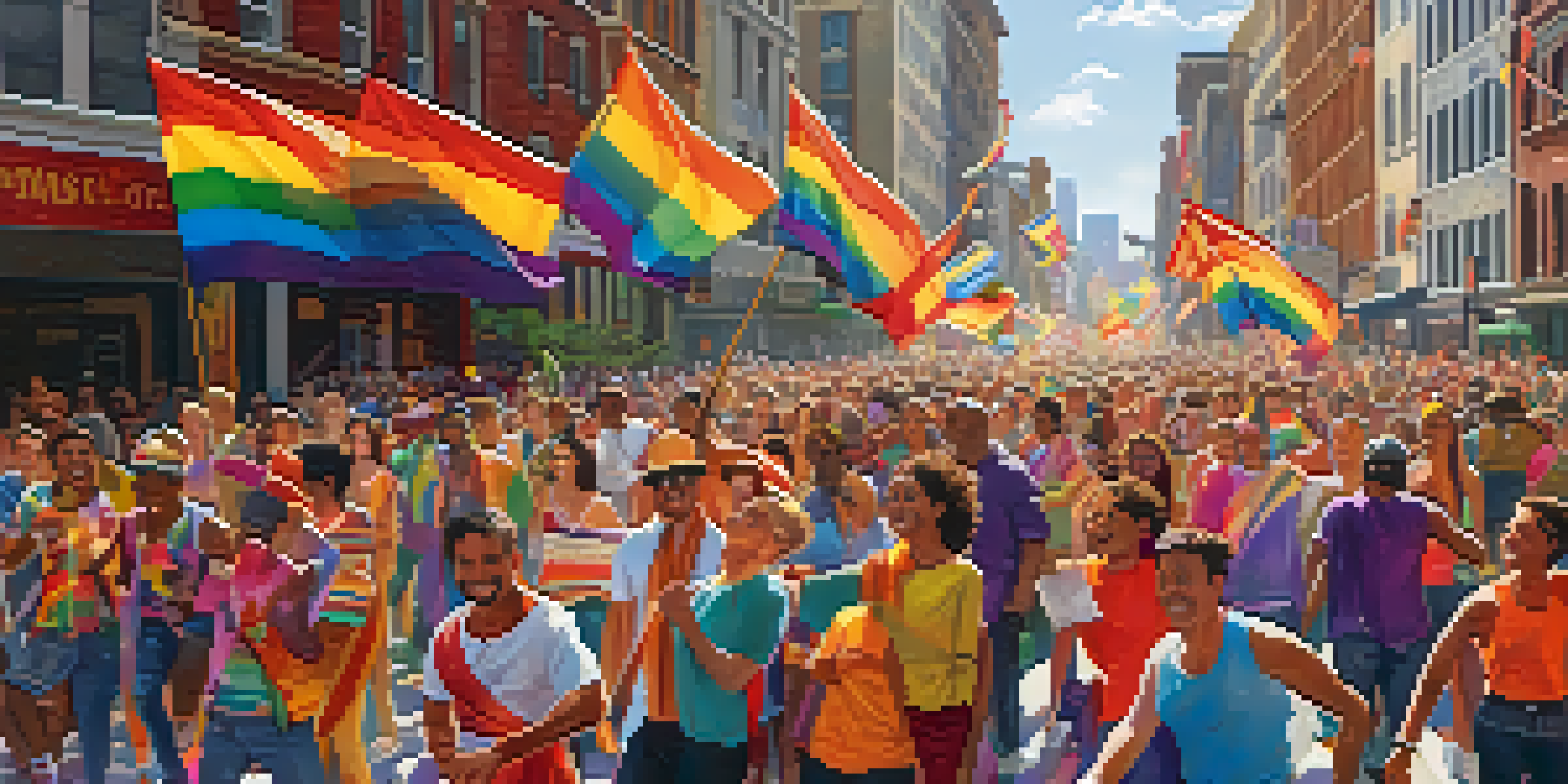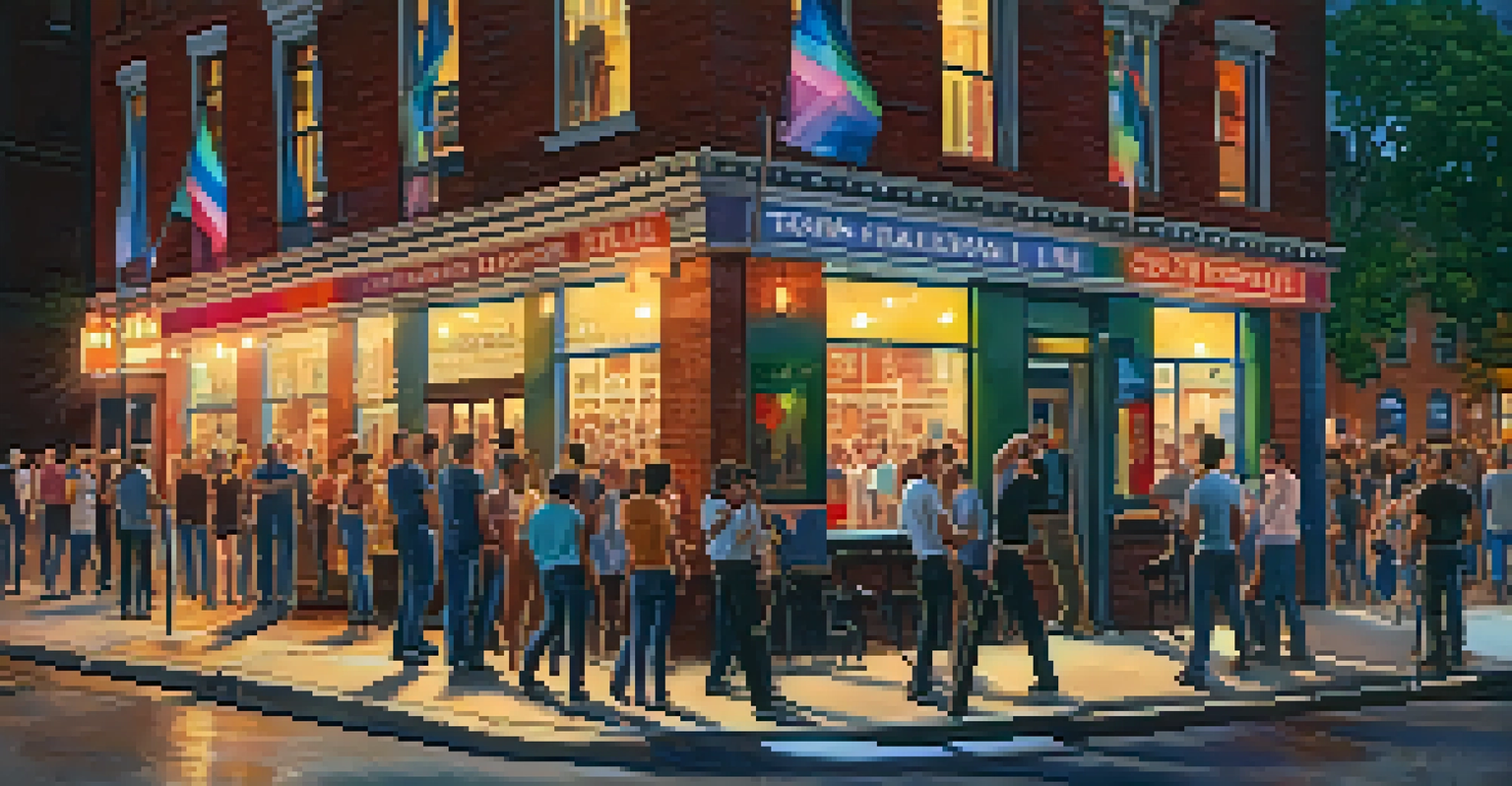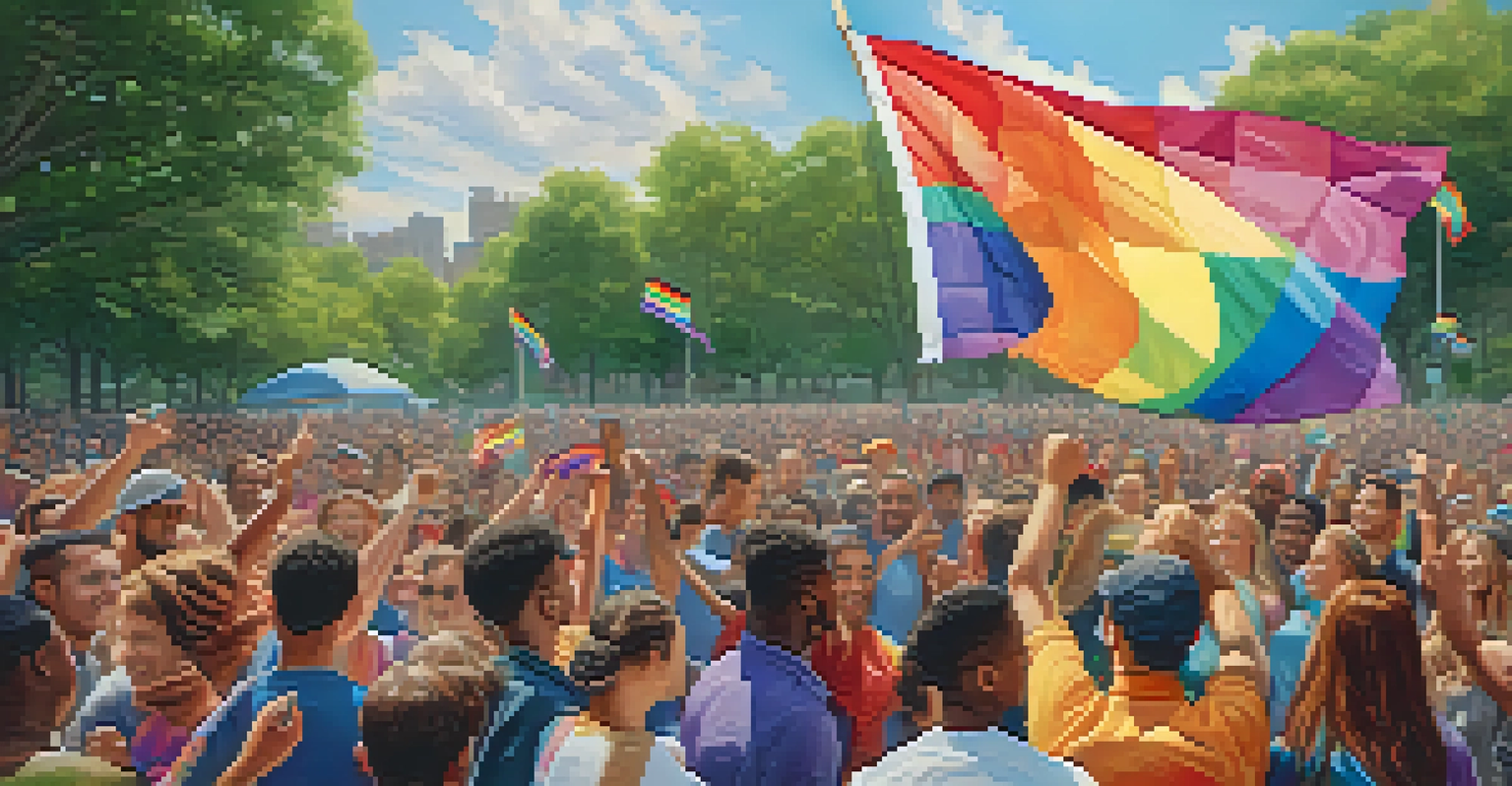Stonewall: The Catalyst for LGBTQ+ Rights in New York City

Understanding the Stonewall Uprising of 1969
The Stonewall Uprising, which took place in June 1969, was a pivotal moment in the fight for LGBTQ+ rights. It erupted at the Stonewall Inn, a popular gay bar in New York City's Greenwich Village, during a police raid. Instead of quietly complying, patrons fought back, marking a significant shift in the LGBTQ+ community's approach to oppression.
The Stonewall Riots were a catalyst for the modern LGBTQ+ rights movement, sparking a fire that ignited activism and visibility.
This uprising was not an isolated incident but rather the culmination of years of systemic discrimination and harassment faced by LGBTQ+ individuals. The bar was a refuge for many, and the violent response from law enforcement ignited long-standing frustrations. In many ways, it was the spark that lit the fire of the modern LGBTQ+ rights movement.
The events at Stonewall catalyzed change, leading to the first Pride marches a year later, which commemorated the uprising and called for rights and recognition. This marked a turning point, transforming the LGBTQ+ community's fight from a quiet struggle into a loud, visible movement demanding justice.
The Role of Activism in LGBTQ+ History
Activism has always been a part of LGBTQ+ history, but the Stonewall Uprising brought it to the forefront. Organizations like the Gay Liberation Front formed soon after, seeking to promote LGBTQ+ visibility and rights. This was a significant shift from previous approaches that often emphasized assimilation rather than confrontation.

The activism that emerged post-Stonewall was characterized by a sense of urgency and a demand for equality. Community members began to organize rallies, protests, and educational campaigns, aiming to raise awareness about issues like discrimination, health care access, and legal recognition. This grassroots activism laid the groundwork for future advancements in LGBTQ+ rights.
Stonewall Ignited LGBTQ+ Activism
The Stonewall Uprising in 1969 catalyzed a shift towards visible activism, inspiring the LGBTQ+ community to organize for equality and rights.
Moreover, the Stonewall Uprising inspired a new generation of activists who understood the power of collective action. The sense of community fostered by these events encouraged individuals to stand up for their rights and the rights of others, creating a ripple effect that would be felt for decades.
The Impact on LGBTQ+ Culture and Identity
Stonewall reshaped LGBTQ+ culture, encouraging individuals to express their identities openly and unapologetically. The sense of pride and community that emerged from the uprising fostered a cultural shift that embraced diversity in sexual orientation and gender identity. This newfound visibility helped normalize LGBTQ+ identities in mainstream society.
The beauty of standing together is that we can push back against discrimination and ensure that the legacy of Stonewall continues to inspire change.
As a result, LGBTQ+ culture began to flourish, with art, music, and literature reflecting the experiences of queer individuals. Events like Pride parades became celebrations of identity and activism, drawing larger crowds and gaining attention from media outlets. This cultural recognition helped bridge gaps between LGBTQ+ communities and the broader society.
However, the path was not always smooth. While Stonewall marked the beginning of greater visibility, it also exposed divisions within the community regarding race, gender identity, and socioeconomic status. These ongoing conversations about intersectionality continue to shape the LGBTQ+ landscape today.
The Legacy of Stonewall in Modern Activism
The legacy of Stonewall lives on through contemporary LGBTQ+ activism, influencing movements for equality worldwide. It serves as a reference point for current struggles, reminding activists of the power of collective action. Today, the fight for LGBTQ+ rights continues, addressing issues like marriage equality, transgender rights, and anti-discrimination laws.
Modern activists often draw inspiration from the courage displayed during the Stonewall Uprising. This historical event serves as a reminder that change is possible when communities unite. The narratives of those who fought at Stonewall are preserved and celebrated, inspiring new generations to advocate for their rights.
Intersectionality Shapes Advocacy
Understanding intersectionality has become crucial in modern LGBTQ+ activism, as it aims to include the diverse experiences of marginalized voices within the movement.
In addition, Stonewall has become a symbol of resilience and defiance against oppression. Its recognition through memorials and celebrations around the world helps maintain awareness of LGBTQ+ history, ensuring that the struggles and victories of the past are not forgotten.
The Importance of Intersectionality in LGBTQ+ Rights
While Stonewall was a catalyst for LGBTQ+ rights, it also highlighted the importance of intersectionality within the movement. Many of the early activists were predominantly white and cisgender, which led to the marginalization of voices from LGBTQ+ people of color and transgender individuals. Understanding intersectionality means recognizing that different identities experience oppression in unique ways.
This awareness has become crucial in modern activism, as the movement strives to be more inclusive. Efforts are being made to amplify the voices of those historically pushed to the margins, ensuring that the fight for rights encompasses the needs of all members of the LGBTQ+ community. Events like Transgender Day of Remembrance honor those lost to violence, reminding us that the struggle is ongoing.
Intersectionality encourages a broader understanding of justice and equality, pushing for a more holistic approach to advocacy. By acknowledging the diverse experiences within the community, activists can create more effective strategies that address the needs of all individuals, fostering solidarity and unity in the fight for rights.
Continuing Challenges for the LGBTQ+ Community
Despite the progress made since Stonewall, challenges remain for the LGBTQ+ community. Discrimination, particularly against transgender individuals and LGBTQ+ people of color, persists in various forms, including in employment, healthcare, and housing. This ongoing oppression serves as a stark reminder that the fight for equality is far from over.
Moreover, political backlash in some regions threatens the rights that have been fought for over the years. Legislative attacks on LGBTQ+ rights have emerged, highlighting the need for continued vigilance and activism. The community must remain engaged to protect the rights gained and to advocate for further advancements.
Ongoing Challenges Persist Today
Despite progress since Stonewall, the LGBTQ+ community continues to face discrimination and legislative backlash, necessitating ongoing activism and solidarity.
Grassroots organizations continue to play a vital role in addressing these challenges, providing support, resources, and advocacy. By standing together, the community can push back against discrimination and ensure that the legacy of Stonewall continues to inspire change.
Celebrating the Legacy of Stonewall Today
Today, the Stonewall Inn stands not only as a historic site but also as a symbol of resilience and pride for the LGBTQ+ community. Events like Pride Month commemorating the uprising serve as a celebration of progress, reminding us of the importance of visibility and advocacy. These celebrations bring together individuals from all walks of life, reinforcing the message of unity.
In addition to celebrations, education about Stonewall and its significance is crucial. Schools, organizations, and communities are increasingly recognizing the importance of teaching LGBTQ+ history, ensuring that future generations understand the struggles and victories of those who came before them. This educational aspect helps foster empathy and acceptance.

Ultimately, celebrating Stonewall means acknowledging both the achievements and the ongoing struggles within the LGBTQ+ community. By honoring the past, we can inspire action for the future, ensuring that the fight for equality continues with passion and purpose.